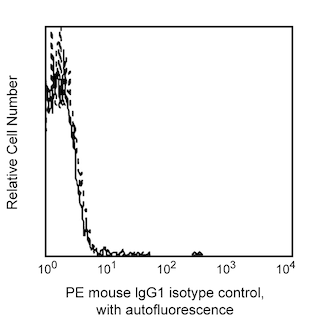Old Browser
This page has been recently translated and is available in French now.
Looks like you're visiting us from {countryName}.
Would you like to stay on the current country site or be switched to your country?


.png)


Flow cytometric analysis of CD137 expression on viable stimulated Human peripheral blood lymphocytes. Concanavalin A (Con-A)-stimulated (3 days) peripheral blood mononuclear cells (PBMC) were stained with either PE Mouse IgG1, κ Isotype Control (Cat. No. 554680; dashed line histogram) or PE Mouse Anti-Human CD137 antibody (Cat. No. 555956/561701; solid line histogram). DAPI (4',6-Diamidino-2-Phenylindole, Dihydrochloride) Solution (Cat. No. 564907) was added to cells right before analysis. The fluorescence histogram showing the expression of CD137 (or Ig Isotype control staining) was derived from gated events with the forward and side light-scatter characteristics of viable (DAPI-negative) activated lymphocytes. Flow cytometry and data analysis were performed using a BD LSRFortessa™ X-20 Cell Analyzer System and FlowJo™ Software.
.png)


BD Pharmingen™ PE Mouse Anti-Human CD137
.png)

PE Mouse Anti-Human CD137
Regulatory Status Legend
Any use of products other than the permitted use without the express written authorization of Becton, Dickinson and Company is strictly prohibited.
Preparation And Storage
Recommended Assay Procedures
BD® CompBeads can be used as surrogates to assess fluorescence spillover (compensation). When fluorochrome conjugated antibodies are bound to BD® CompBeads, they have spectral properties very similar to cells. However, for some fluorochromes there can be small differences in spectral emissions compared to cells, resulting in spillover values that differ when compared to biological controls. It is strongly recommended that when using a reagent for the first time, users compare the spillover on cell and BD® CompBeads to ensure that BD® CompBeads are appropriate for your specific cellular application.
Product Notices
- Please refer to www.bdbiosciences.com/us/s/resources for technical protocols.
- This reagent has been pre-diluted for use at the recommended Volume per Test. We typically use 1 × 10^6 cells in a 100-µl experimental sample (a test).
- An isotype control should be used at the same concentration as the antibody of interest.
- Caution: Sodium azide yields highly toxic hydrazoic acid under acidic conditions. Dilute azide compounds in running water before discarding to avoid accumulation of potentially explosive deposits in plumbing.
- For fluorochrome spectra and suitable instrument settings, please refer to our Multicolor Flow Cytometry web page at www.bdbiosciences.com/colors.
- Source of all serum proteins is from USDA inspected abattoirs located in the United States.
- Please refer to http://regdocs.bd.com to access safety data sheets (SDS).
- For U.S. patents that may apply, see bd.com/patents.
Companion Products



The 4B4-1 monoclonal antibody specifically binds to CD137 which is also known as 4-1BB, and ILA (induced by lymphocyte activation). CD137 is a type I transmembrane glycoprotein that belongs to the TNF/NGF receptor family. It is encoded by TNFRSF9 (tumor necrosis factor receptor superfamily, member 9). CD137 is expressed on activated T cells, B cells, monocytes, and follicular dendritic cells. CD137 plays roles in the costimulation, differentiation and survival of T cells and B cells.

Development References (5)
-
Garni-Wagner BA, Lee ZH, Kim YJ, Wilde C, Kang CY, Kwon BS. 4-1BB is expressed on CD45RAhiROhi transitional T cell in humans. Cell Immunol. 1996; 169(1):91-98. (Biology). View Reference
-
Hurtado JC, Kim SH, Pollok KE, Lee ZH, Kwon BS. Potential role of 4-1BB in T cell activation. Comparison with the costimulatory molecule CD28. J Immunol. 1995; 155(7):3360-3367. (Biology). View Reference
-
Hurtado JC, Kim YJ, Kwon BS. AAI Meeting, Abstract #841. San Francisco: 1997.
-
Kim YJ, Kim SH, Kwon BS. AAI Meeting, Abstract #838. San Francisco: 1997.
-
Zhou Z, Kim S, Hurtado J, et al. Characterization of human homologue of 4-1BB and its ligand. Immunol Lett. 1995; 45(1-2):67-73. (Biology). View Reference
Please refer to Support Documents for Quality Certificates
Global - Refer to manufacturer's instructions for use and related User Manuals and Technical data sheets before using this products as described
Comparisons, where applicable, are made against older BD Technology, manual methods or are general performance claims. Comparisons are not made against non-BD technologies, unless otherwise noted.
For Research Use Only. Not for use in diagnostic or therapeutic procedures.
Report a Site Issue
This form is intended to help us improve our website experience. For other support, please visit our Contact Us page.